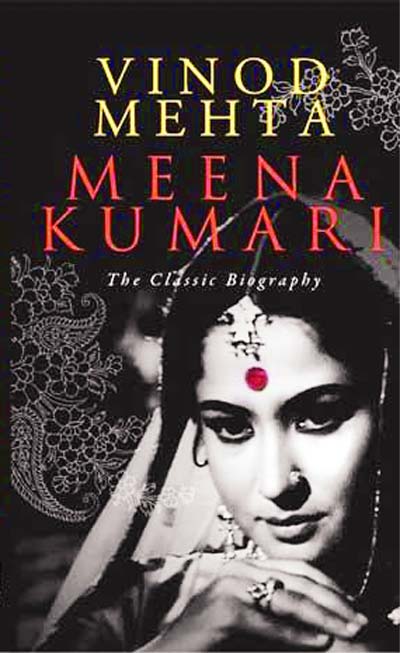Meena Kumari ruled Hindi cinema for two decades. But when she died, she was penniless. Utpal Kumar reviews Vinod Mehta’s book on the actress
Meena Kumari: The Classic Biography
Author: Vinod Mehta
Publisher: HarperCollins, Rs 350
life always comes full circle, we are told. Maybe that explains Vinod Mehta’s decision to begin his book, Meena Kumari: The Classic Biography, with the death of the actress, unarguably the country’s greatest tragedienne whom the author fondly addresses as “My heroine”. Born as Mahajabeen to a poor Muslim household in a tenement in Bombay that was “spectacularly unfit for human living”, she was an unwanted child to her parents who desired to have a son.
Meena started working at the age of seven as a child artist to keep the household running, and for the next 32 years, till her death in March 1972, she just worked, worked and worked, becoming one of the most successful actresses of her times. Mehta informs us that in 1962, the year China thrashed India and trampled upon its Nehruvian dreams, the three films that competed with each other for the Filmfare’s best actress award were Meena Kumari’s — a feat unequalled to date. Yet, when death approached her, she had no money to get herself admitted to a hospital. And after she passed away, her relatives couldn’t even arrange Rs 3,500 to get her body released from the hospital! It was left to her doctor to settle the bill.
No doubt, Meena Kumari was exploited by one and all: First her parents, then her relatives and husband, and finally her lovers. But she was equally at fault. In the last decade of her life, she seemed to view herself as an extension of Chhoti Bahu, the legendary role she had played in Guru Dutt’s Saheb Bibi Aur Ghulam (1962). The film, wherein she evoked the image of a suffering wife who took to alcohol to please her philandering husband, perhaps caught her imagination rather too seriously. Mehta quotes a passage from her diary where she writes, “This woman is troubling me a great deal. All day long — and a good part of the night — it is nothing else but Chhoti Bahu’s helplessness. Chhoti Bahu’s sorrows, Chhoti Bahu’s smiles, Chhoti Bahu’s hopes, Chhoti Bahu’s tribulations, Chhoti Bahu’s endurance... Oh! I am sick of it.” Meena thought so much of her that the two became one. And, like her reel avatar, she took to alcohol like a fish takes to water. Things came to such a pass that the “bottles of Dettol in the bathroom did not contain antiseptic but brandy”.
The author tells us that Meena Kumari had nearly missed the role of Chhoti Bahu. When she was approached for Saheb Bibi Aur Ghulam, “she had her hands full with pending commitments”. Guru Dutt then tried an Indian girl living in london but “she was entirely unsuitable”. Desperate, he completed the entire film by 1962 except for the role of Chhoti Bahu. As fate would have it, the next time Guru Dutt approached Meena Kumari, she had ample time for the movie. What if she had not done this filmIJ Maybe she would have lived longer, who knowsIJ But then she wouldn’t have been the Meena Kumari we know today.
To Mehta’s regret, he could never meet Meena Kumari personally. While critics would call it a major flaw in his biography, it is not without its advantages. Being not associated with the actress directly, Mehta could write a no-holds-barred biography, with no overt sympathies for the actress. No wonder, one finds the book being generous to Kamal Amrohi and Dharmendra, who are seen by many as villains of the piece. Far from it, the book shows that the failure of the marriage was as much due to Amrohi’s ego as it was because of lack of sincerity on Meena’s part. If Amrohi was “a man of no mean self-importance” who began to feel that “his only function in life was to organise film dates for his wife — sort of manager”, Meena too did nothing to correct this perception. She realised her folly while completing Pakeezah, but by then it was too late. As for Dharmendra, who has been charged with using Meena Kumari to gain a foothold in Hindi cinema, Mehta tells us how he has never tried to deny the debt he owed her. Meena too, even after she had stopped seeing Dharmendra, had great regard for him till the end.
The high point of the book is the making of Pakeezah. Shot over 14 years, the film became the actress’s swan song and her death, shortly after its release, helped the movie achieve great success. Mehta eloquently analyses the reasons that brought the two together to complete the film. The most touching episode associated with Pakeezah, however, had nothing to do with Meena Kumari or Amrohi. It was about Ghulam Mohammed, the composer of the unforgettable Pakeezah songs. The inordinate delay in the making of the film hurt him the most. “Borrowing a tape recorder,” Mehta tells us, “Mr Mohammed made rounds to the producers. He played them his Pakeezah songs... The producers were unimpressed. This was no music, they said... Could he produce something more contemporary, more jazzyIJ Poor Ghulam Mohammed would return with his tape recorder.” In 1968, four years before the film was released, he died with no money to buy medicines.
So far so good, but the book is not a biography in the true sense, far from being a ‘classic’ biography. It’s a pacy, juicy and engaging account of the country’s greatest tragedienne and her marriage and affairs. Her films, however, are mostly ignored, except the few better known ones. The book, ultimately, is for those seeking an introduction to the actress about whom, sadly, not many know today.


























